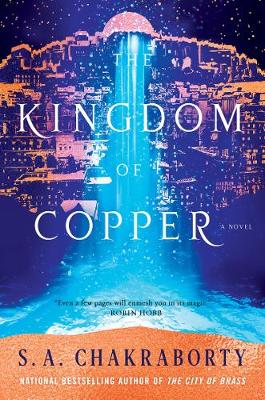
Return to Daevabad in the spellbinding sequel to THE CITY OF BRASS.
In Daevabad, where djinn can summon flames with a snap of their fingers, where rivers run deep with ancient magic, and blood can be as dangerous as any spell, a clever con artist from Cairo will alter the fate of a kingdom.
Nahri's life changed forever when she accidentally summoned Dara, a formidable, mysterious djinn, during one of her schemes. Thrust into the dazzling royal court of Daevabad, she needed all of her grifter instincts to survive. Now, as Nahri embraces her heritage and her power, she must forge a new path.
Exiled for daring to defy his father, Ali is adrift on the unforgiving sands of his ancestral land, hunted by assassins and forced to rely on frightening new abilities that threaten to reveal a terrible family secret.
And as a new century approaches and the djinn gather within Daevabad's brass walls to celebrate, a power in the desolate north will bring a storm of fire straight to the city's gates . . .
- ISBN10 0062678132
- ISBN13 9780062678133
- Publish Date 22 January 2019
- Publish Status Active
- Publish Country US
- Publisher HarperCollins Publishers
- Imprint Collins
- Format Hardcover
- Pages 640
- Language English
Reviews


anne

alindstadtcorbeax
!!! I’m having a freakin’ heart attack rn. My Goddddd this series is amazing!
RTC

cornerfolds
Review to come!

Jo
WARNING! I cannot review this book without spoiling the first book in the series. Read no further if you're planning on reading this series and don't want it spoilt for you.
Trigger Warnings: This book features prejudice and discrimination akin to racism, poisoning, discussion of self-harm, discussion of genocide, discussion of past wars, battles, and death.
I absolutely adored The City of Brass when I read it last year, and have been patiently but desperately waiting for the sequel ever since. The Kingdom of Copper was absolutely worth the wait! It was incredible, and so epic!
After a prologue that seems to be set a few months after the end of The City of Brass, the majority of The Kingdom of Copper is set five years later. Forced to do so by King Ghassan, Nahri is now married to the emir, Prince Muntadhir, and has her every move watched. If she puts even a toe out of line, Ghassan will have others punished in her stead. He rules with an iron fist, and there's very little she can do without permission. She's stuck working in the infirmary with Nisreen, her mentor, and allowed to do little else, while watching as Ghassan hurts others with his tyrannical rule, not being able to do anything to help.
Ali is in Bir Nabat, a small village in Am Gezira that took him in after he was wounded after being chased by assassins. Because of his possession by the marid, he has some residual abilities relating to water, and Bir Nabat, once a place of drought and poverty, is now thriving and green. While they may not have a lot, they have food and water. He loves his small life here, helping the village and keeping everything going, and he himself is thriving. But the schemes of others pull him back to Daevabad.
Although Dara was killed by Ali, was brought back to life (not a spoiler, we find this out in the prologue) by Manizheh, a Nahid everyone but a small number of Daeva believe dead - and Nahri's mother. Now he takes him commands from Manizheh, training former Daeva soldiers for Manizheh's plans to attack and retake Daevabad. He's really struggling with being a Nahid's Afshin again; while he believes the Nahids should rule Daevabad, and it is his purpose to obey, he's having regrets over the orders he has followed in the past, and is concerned about what he may commanded to do as Manizheh seeks revenge.
This is where everyone is when the book starts. Navasatem is coming up, a celebration to mark the turn of the century, and everyone has plans for it. Having made it back to Daevabad, Ghassan forbids Ali from leaving until after Navasatem, which is six months away. Ali takes this hard, as Bir Nabat is the only place he wants to be, his brother Muntadhir absolutely cannot stand him, and Nahri wants nothing to do with him. When Nahri discovers the existence of the ruins of a former Nahid hospital, she is desperate to see it to its former glory, to open its doors to more people, to train others as healers, and to team up with shafit - half human, half djinn - healers, to heal all - djinn and shafit alike. It seems such a small thing, but it means everything to her, and with Ghassan being Ghassan, she knows she needs help to get him to approve it, so she ropes in Ali to help with the business side of things, because he owes her. She cannot bear to be around him after he killed Dara, but bringing the hospital back to life, and trying to take a step to build peace between the Daeva and the shafit, when prejudices are still rife, and tensions at an all time high, is too important. Ali is all too keen to help, to try and fix things with Nahri, and it's actually something he's good at and believes in himself. Meanwhile, Dara is helping Manizheh with her plans, becoming more and more uneasy with what they're going to do, but, as Manizheh says, the plans will go ahead with or without him, but without him, those they care about are more likely to die.
And I can't say much more. While I was thoroughly enjoying reading The Kingdom of Copper, until maybe just over half way through, I was thinking this going to be more of a "set-up" book. A book where certain things needed to happen after The City of Brass, that allowed certain events to take place in the final book. But I was completely wrong. It's more like the first half of the book is the set-up for the second half. It is slower, it's quieter, after the explosive end of The City of Brass, but it's moving pieces into place for what's to come. And it's interesting! Seeing these relationships that are nothing like they were, and seeing if gaps can be bridged, friendships repaired, or seeing other relationships disintegrate. Seeing certain characters really struggle with what is happening around them and not being able to do anything about it. Seeing loyalty become doubt. Seeing eyes open and conclusions made. The second half of this book is absolutely epic, so full of action and with so many twists, and it's incredible! But it can only happen with the quieter first half.
For me, The City of Brass was all about prejudice and discrimination. The various conflicts between tribes, the despicable ill-treatment of the Shafit. But The Kingdom of Copper is about asking what's right and what's wrong. Where The City of Brass was all loyalty to your tribe and your people, which we saw through Nahri's conversations with Ali and Dara, The Kingdom of Brass is about the very same characters asking themselves what they can abide, and what they cannot. What can be forgiven, and what cannot. It's about them seeing that, time and time again, it's been a vicious circle of violence breeding violence. It's about people not being able to stand with their family or their people, but instead standing for what is right. We see them start to see the djinn not as separate tribes, but as one people, and the Shafit not as "dirt bloods" but family - they're half djinn, after all. We see our characters really think about things, questioning what they know and all they've seen and experienced. Justice and vengeance are not the same thing, and they start to realise that things have to stop somewhere, or it will never end. Decisions are made to stop it, even if it is seen as a betrayal by their own. But while that's all well and good, there are still those with more power, who have their own ideas. And some things others put into motion that you can't stop. And when catastrophe strikes, whose side will our characters be on?
I thought the ending of The City of Brass was explosive, but mate, it's nothing compared to how The Kingdom of Copper ends. The action! The twists! The consequences! The emotion and the heartbreak! It was just mind-blowingly good. The events at the end of this book are astronomical, and no-one is going to be unchanged. I am in a place where I have absolutely no idea how things will play out in the third and final book in the trilogy, The Empire of Gold, and it's so damn exciting! But I also think it's going to be unbelievably emotional, as well as really up the ante in regards to politics and action. The Kingdom of Copper was epic, but The Empire of Gold is going to be colossal, and I absolutely cannot wait!
Thank you to HarperVoyager via NetGalley for the eProof.

Martha G

Briana @ Pages Unbound
Initial Thoughts:
After two books, I'm finally starting to understand the politics of this place. Who the "good guys" are is much clearer. The side characters are still more interesting than the main characters. The author seems to have used the five year time jump to substitute for character development. Suddenly Nahri believes in "her people's" religion, is invested in "her people," etc. when in the first book she didn't care and didn't know anyone in the city. Nahri is way less active than I'd like in this book, however. She ends book one by saying she always smiles at her marks, which sounds exciting. Then she does...nothing. She even references being tired of scheming near the end of *this* book when she might have been the person in the book doing the least scheming of all.

Quirky Cat
The Kingdom of Copper is the second book in the Daevabad Trilogy by S.A. Chakraborty. The City of Brass was beautifully written, with an exquisite amount of detail and character development. I knew right away that this book wouldn’t be any different, and I couldn’t wait to get my hands on it.
So far I’ve seen two covers for The Kingdom of Copper. I’ll admit that I like one of them much more than the other. Though both are quite striking. I just happen to love the cover that is a better compliment to the first novel. Got to love a complete set, right?
So a quick side story before we begin: I was approved to read and review an advanced copy of The Kingdom of Copper through Edelweiss. I was so excited when I got the message! However, because I put my request in a bit on the late side, I only had a week to read an incredibly complex and beautifully written book. So I sat down and read this entire book in one sitting. It made for a fantastic weekend. Everyone understood why I wanted to be left alone to my book and were really understanding about it. I got to read a book I loved, and ignore people while doing it, all without feeling guilty. It felt amazing!
The Kingdom of Copper met all of the expectations I’ve built over the last year and then exceeded them. I was blown away by the number of details included in this novel, the level of character development that occurred, and the complexity of all the planning and plotting that occurred throughout.
This novel contains so much within it; I’m not even remotely surprised by the page count. If anything I’d almost expect it to be higher! Still, not once did it feel like the pace was dragging. There was always something going on here. Either a character was plotting something, or they were reacting to something else or dozens of other situations.
The novel switched between three main perspectives, as the last one did. Nahri, Dara, and Ali all got their own perspectives/chapters again. Based on how the City of Brass concluded, you can rightly assume that these perspectives do not all start out in the same place. I personally loved this, because it meant we got to learn so much more about what was going on in and outside of the city, while also catching up with all of my favorite characters.
This novel made me feel so much. S.A. Chakraborty has a way of writing these emotionally compelling tales. They tear me up and then sew me back together. I’m constantly on the edge of my seat while reading – waiting for the next big event to come around the corner.
The character development for this series was sublime. I loved seeing the different ways each of our three main characters processed different situations. Seeing them all plot and fight to survive totally unique situations…it was breathtaking.
As for all of the political maneuvers and plotting in this novel…I just couldn’t get enough. I don’t think a novel with less complexity could have supported some of these schemes, and it would have been a great loss indeed. I loved reading every single detail, from the good to the bad.
What I’ve always found really intriguing about this series is the distinction between Djinn and Daeva. For many, it may seem like a small matter, but for these people, the differences could fill a chasm. It’s really quite fascinating to see it all.
I’m so happy to have had the chance to read Kingdom of Copper early, and already I’m finding myself anxiously awaiting any news about the next novel. I’ll be sad to see this series end, but simultaneously I can’t wait to see how it’ll all wrap up.
For more reviews, check out Quirky Cat's Fat Stacks
